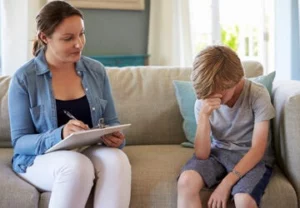Family trauma can have a significant effect on people, which frequently results in mental annoyance, strained relationships, and behavioral changes. Finding help from a family trauma psychologist can be helpful in the healing process when dealing with the effects of traumatic events within a family unit. We shall discuss the idea of family trauma, its repercussions, and the function of a family trauma psychologist in this post.
Contents
What Is Family Trauma?
 Family trauma guides the deep and enduring impact of traumatic incidents on the components of a family. It is the consequence of cases or circumstances that destroy the family’s sense of safety, peace, and well-being. These traumatic affairs can take various forms, such as natural catastrophes, accidents, or ongoing stressors like poverty or addiction.
Family trauma guides the deep and enduring impact of traumatic incidents on the components of a family. It is the consequence of cases or circumstances that destroy the family’s sense of safety, peace, and well-being. These traumatic affairs can take various forms, such as natural catastrophes, accidents, or ongoing stressors like poverty or addiction.
Family trauma affects each family member differently, but it often leads to a range of challenging and distressing symptoms. Individuals may experience heightened anxiety, anger, guilt, or shame. They may struggle with trust, communication, and intimacy within the family unit. Children are particularly vulnerable to the effects of trauma and may exhibit behavioral problems, or emotional disturbances.
Family trauma is not limited to the immediate aftermath of a traumatic event it can have long-lasting consequences that persist across generations. Unresolved trauma can be transmitted from parents to children, impacting their emotional well-being and functioning.
Impacts Of Family Trauma On Individuals
 Family trauma can have profound impacts on individuals, affecting their emotional well-being, psychological functioning, and overall quality of life.
Family trauma can have profound impacts on individuals, affecting their emotional well-being, psychological functioning, and overall quality of life.
Here are some common effects of family trauma on individuals:
- Emotional Distress: Individuals may experience a range of intense emotions, including sadness, fear, anger, guilt, and shame. They may have difficulty regulating their emotions and may feel overwhelmed or emotionally numb.
- Post-Traumatic Stress Symptoms: Family trauma can lead to symptoms of post-traumatic stress disorder (PTSD), such as intrusive memories or flashbacks of the traumatic event, nightmares, hypervigilance, and a heightened startle response. These symptoms can significantly impact daily life and overall functioning.
- Depression: Individuals may develop anxiety disorders or depression as a result of family trauma. They may experience persistent worry, panic attacks, social withdrawal, loss of interest in previously enjoyed activities, or feelings of hopelessness.
- Relationship Difficulties: Family trauma can disrupt healthy relationship dynamics. Individuals may struggle with trust, intimacy, and communication in their relationships, both within the family and with others outside of it. They may have difficulties forming and maintaining secure attachments.
- Self-Esteem and Identity Issues: Family trauma can affect an individual’s self-perception and sense of identity. They may experience feelings of worthlessness, self-blame, or a distorted self-image. They may struggle with low self-esteem and have difficulty asserting their needs and boundaries.
- Behavioral Problems: Children and adolescents who have experienced family trauma may exhibit behavioral issues, such as aggression, defiance, or acting out. They may have difficulty following rules or may engage in risky behaviors as a way to cope with their distress.
- Physical Health Problems: Family trauma can also impact physical health. Individuals may experience a range of physical symptoms, including headaches, stomachaches, sleep disturbances, and weakened immune system functioning.
- Academic and Occupational Challenges: Family trauma can interfere with an individual’s ability to focus, concentrate, and perform well academically or at work. They may struggle with memory problems or have difficulty staying motivated and engaged.
It is important to note that the impacts of family trauma can vary from person to person, and individuals may exhibit a combination of these effects.
Understanding The Role Of Family Psychologists
 A family trauma psychologist plays a crucial role in supporting individuals and families affected by trauma.
A family trauma psychologist plays a crucial role in supporting individuals and families affected by trauma.
Here are some key roles and responsibilities of a family trauma psychologist:
- Assessment and Diagnosis: A family trauma psychologist assesses the impact of trauma on individuals and the family system. They use various assessment tools and techniques to evaluate the emotional, psychological, and relational effects of trauma.
- Individual and Family Therapy: One of the primary roles of a family trauma psychologist is to provide therapy to individuals and families. They create a safe and supportive environment where individuals can explore their traumatic experiences, express their emotions, and work towards healing. The psychologist helps clients develop coping strategies, process their trauma-related memories and emotions, and build resilience.
- Trauma-Focused Interventions: Family trauma psychologists utilize evidence-based interventions specifically designed for trauma. They may incorporate approaches such as Trauma-Focused Cognitive Behavioral Therapy (TF-CBT), Eye Movement Desensitization and Reprocessing (EMDR), or other trauma-focused modalities to address the unique needs of individuals and families affected by trauma.
- Psychoeducation and Skill Building: Family trauma psychologists provide psychoeducation to individuals and families, helping them understand the nature and effects of trauma. They teach coping skills, stress management techniques, and strategies to regulate emotions.
- Support and Validation: Family trauma psychologists offer a supportive and non-judgmental space for individuals and families to share their experiences and emotions. They validate their feelings and experiences, providing a sense of understanding and empathy.
- Trauma-Informed Advocacy: Family trauma psychologists advocate for trauma-informed practices and policies within various settings, such as schools, healthcare systems, or social service agencies. They work to raise awareness about the impact of trauma and promote environments that are sensitive, supportive, and understanding of trauma-related needs.
By fulfilling these roles, family trauma psychologists aim to help individuals and families heal from trauma, rebuild their lives, and foster resilience in the face of adversity.
Therapies Considered In Family Trauma Treatment
There are multiple therapies that are used in addressing family trauma and all these are having their own significance as well. Here are some commonly utilized approaches:
T-F Cognitive Behavioral Therapy
 TF-CBT is an evidence-based therapy approach that focuses on addressing the emotional and cognitive aspects of trauma. It involves helping individuals and families understand the connection between thoughts, feelings, and behaviors related to traumatic experiences. TF-CBT incorporates techniques such as psychoeducation, and relaxation exercises.
TF-CBT is an evidence-based therapy approach that focuses on addressing the emotional and cognitive aspects of trauma. It involves helping individuals and families understand the connection between thoughts, feelings, and behaviors related to traumatic experiences. TF-CBT incorporates techniques such as psychoeducation, and relaxation exercises.
Narrative Therapy
Narrative therapy focuses on exploring and reconstructing the narratives or stories individuals and families create about their traumatic experiences. It involves understanding how these narratives shape their identity, emotions, and relationships. By examining and reframing these narratives, individuals can gain a sense of empowerment and create a more positive and resilient life story.
Family Systems Therapy
Family systems therapy recognizes that family trauma affects the entire family unit and its dynamics. This approach aims to explore and address the relational and communication patterns that may have been disrupted or harmed by trauma. It focuses on improving family interactions, enhancing communication skills, and fostering a supportive and resilient family system.
Mindfulness-Based Approaches
Mindfulness-based approaches, such as Mindfulness-Based Stress Reduction (MBSR) or Mindfulness-Based Cognitive Therapy (MBCT), can be beneficial in managing trauma-related symptoms. These approaches help individuals develop present-moment awareness, self-compassion, and non-judgmental acceptance of their thoughts and emotions.
How Long Does Family Trauma Take To Recover?
 The recovery process for family trauma is highly individualized, and it is challenging to provide a definitive timeline. The duration of recovery can vary significantly based on numerous factors. Such as the severity and nature of the trauma, the individual’s resilience, and the resources and interventions utilized.
The recovery process for family trauma is highly individualized, and it is challenging to provide a definitive timeline. The duration of recovery can vary significantly based on numerous factors. Such as the severity and nature of the trauma, the individual’s resilience, and the resources and interventions utilized.
The duration of recovery is influenced by various factors, including:
- Timeliness of intervention: Early intervention and access to appropriate resources can positively impact the recovery process. Seeking professional help as soon as possible can lead to more effective outcomes.
- Resilience and coping skills: Individuals with higher levels of resilience and effective coping mechanisms may demonstrate quicker recovery and adaptation to the trauma. These factors contribute to their ability to navigate challenges and build resilience.
- Availability of support: The presence of a supportive network, including family, friends, and professionals, can facilitate the recovery process. Emotional support, validation, and understanding from loved ones can be instrumental in promoting healing.
- The severity of trauma: The severity and complexity of the trauma can influence the length of the recovery process. More severe traumas, such as ongoing abuse or repeated exposure to traumatic events, may require extended periods of healing.
- Co-occurring factors: Additional factors, such as the presence of other mental health conditions, ongoing stressors, or external life circumstances, can impact the recovery timeline. These factors may require additional attention and support during the healing process.
It is important to remember that recovery from family trauma is a deeply personal and individual journey. Setting rigid expectations or comparing one’s progress to others’ timelines may not be helpful.
Conclusion
In conclusion, a family trauma psychologist plays a vital role in supporting individuals and families affected by trauma. Through assessment, therapy, and interventions, they assist in understanding and healing the emotional and psychological impact of traumatic experiences. Their expertise in trauma-focused approaches, such as TF-CBT or EMDR. That enables them to guide individuals and families on their recovery journey. By providing a safe and supportive environment. At the time of offering validation and empowerment, and collaborating with other professionals family trauma psychologists help individuals and families navigate the complexities of trauma.
At CoupleMantra our experienced relationship therapists are here to provide you the support and tools you need to heal, grow, and thrive together. Book a trial Online Couple Counseling.


